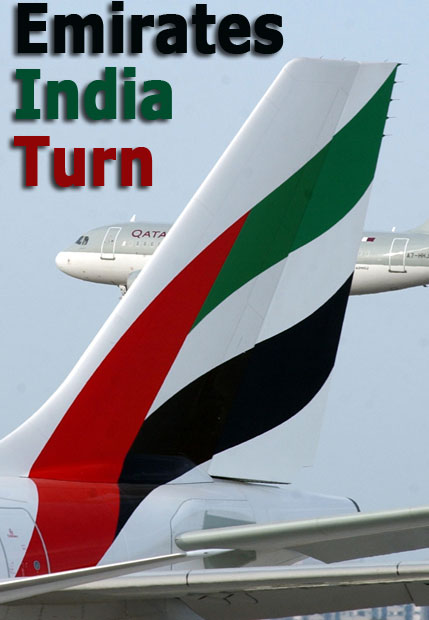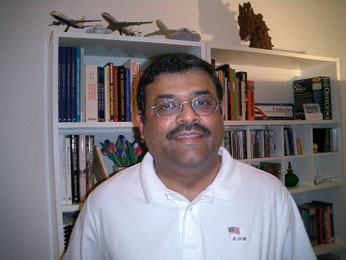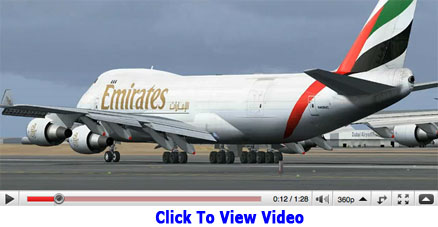 By
now few have to be told that last year—2009 was challenging for
the aircargo sector all over the world. Some bucked the trend, others
wilted, but Ram Menen, Divisional Senior Vice President-Cargo, Emirates,
has faced the downturn head-on. By
now few have to be told that last year—2009 was challenging for
the aircargo sector all over the world. Some bucked the trend, others
wilted, but Ram Menen, Divisional Senior Vice President-Cargo, Emirates,
has faced the downturn head-on.
Talking to Air Cargo News FlyingTypers
after Air Cargo India 2010, Menen managed to say that 2009 was good
and bad.
“The first eight months were very
bad but the last six months started showing a slight growth.
“In the last quarter of 2009 the
economy started rebounding.
“We were optimistic that it would
be back on track from January 2010…
“We had a good three months in the
last quarter of 2009,” he said.
Mr. Menen hoped that the way things would
go would be apparent from the loads that had been picked up from around
January 10 to January 25, 2010.
For most Middle East carriers –
especially Emirates – “India has been a bright spot for
us, during the course of recession.
“India was lot more insulated than
the other regions, and we were happy to bring more capacity to India.
“The capacity increase, however,
was a
pre-planned effort.” Mr. Menen went on to add that while business
with China and India has been directional, “both have been very
good markets for us (in the Middle-East).”
He underlined the fact that “for us Indian traffic has been stable
and we have had growth.
“For us, India, and also Sri Lanka
and Indonesia were the bright spots. China, slipped for a while, but
it started coming back in the last quarter of 2009 strongly.”
So what was the secret to riding the 2009
storm?
 “All
we did,” said Mr. Menen, “was we just adjusted our freight
capacity a bit in 2008 before the crisis hit. “All
we did,” said Mr. Menen, “was we just adjusted our freight
capacity a bit in 2008 before the crisis hit.
“We sold three of our A310 freighters
and then we also had a contract on 747 freighters but we cancelled that
in October last year.
“Having done that we also took on
two brand new 777 freighters.
“What we did was tailor according
to the market requirements and we also slowed down our lift on freighters.”
Pooh-poohing the present economic problems
facing Dubai, Mr. Menen said:
“I think the problem was exaggerated.
“Look at Dubai Airport.
“There is a recovery from its last
year’s performance.
“The airport has shown 9.2 percent
growth in passengers and we got 2.5 percent growth in cargo.
“To me, this growth in itself is
a big achievement.”
Speaking about growth, Ram Menen mentioned
that the “key to growth is consumer buying."
He emphasized “the automobile industry
is coming back again.
“And the automobile industry is
a huge consumer of say, semiconductor chips and all kinds of this stuff.
“If we look back in 2008 when the
air cargo industry was in some kind of a cleft that was the same time
when the automobile industry was also in a cleft.”
 Speaking
specifically about India, Mr. Menen said that the country needed to
move ahead if it wanted to address the road to air cargo maturity. Speaking
specifically about India, Mr. Menen said that the country needed to
move ahead if it wanted to address the road to air cargo maturity.
The top priority, he said, was land transportation
infrastructure.
“Air cargo depends a lot on land
transportation: the roads, the trucking and the distribution part of
it.
“These needed to be improved.
“From the air cargo side, the facilities
at airports should be modernized.” Highlighting the facilities
at Mumbai Airport, Mr. Menen said, “If you go around the old cargo
village area, it looks like a dog’s breakfast. In
Delhi, they have taken a very different approach …these are the
areas that still need to be focused”.
Despite these difficulties, the cargo
sector in India, said Mr. Menen, is going to be very strong.
“India had been concentrating on
services for such a long time, now they are looking at industrialization”
and that was a good thing.
Mentioning the facilities offered by Deccan
360 and Blue Dart, among others, he said, “they are making domestic
air cargo operations more viable.
“You have a lot to move domestically
and a lot of the movement will be time critical.
“Air cargo and its environment have
become a very critical part of supply chain management... They have
become major tools,” he declared.
Saying that the industry was on track,
the Emirates cargo boss went on to point out “we are still on
positive growth and I am expecting the last two quarters or the second
half of this year will be stronger.”
TG Ghosh
|



